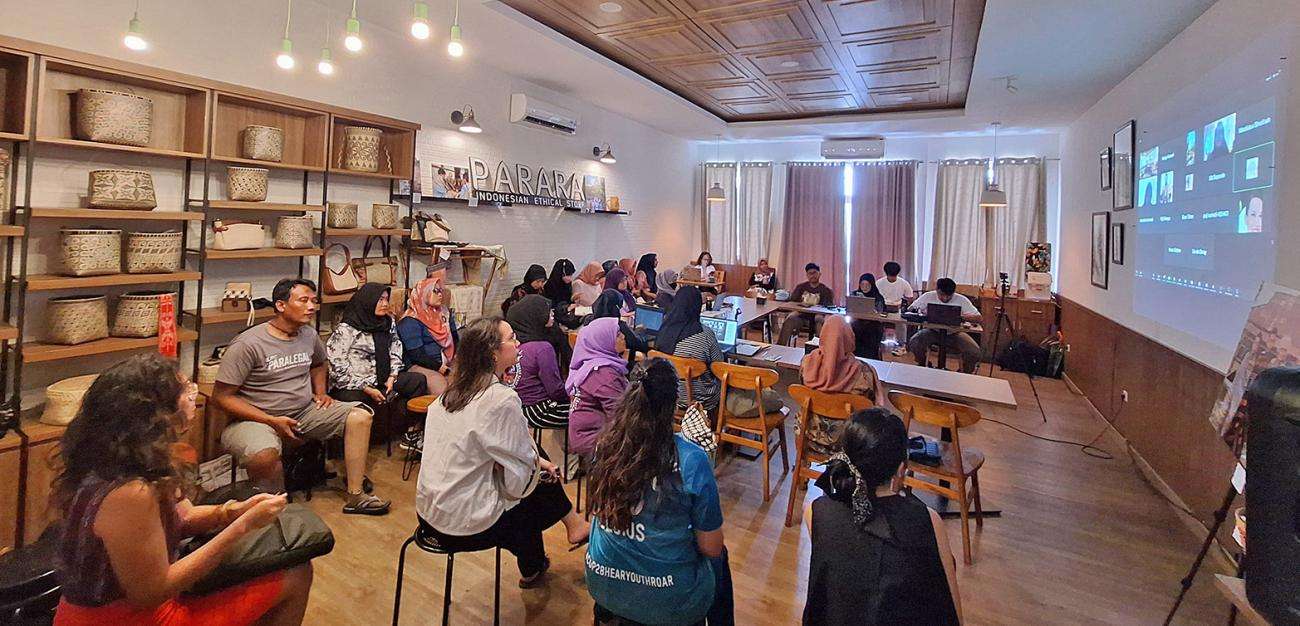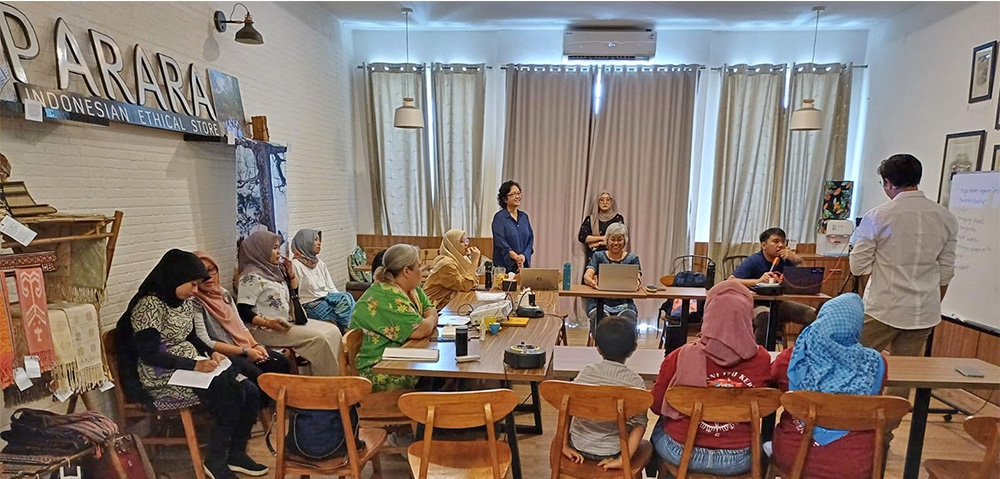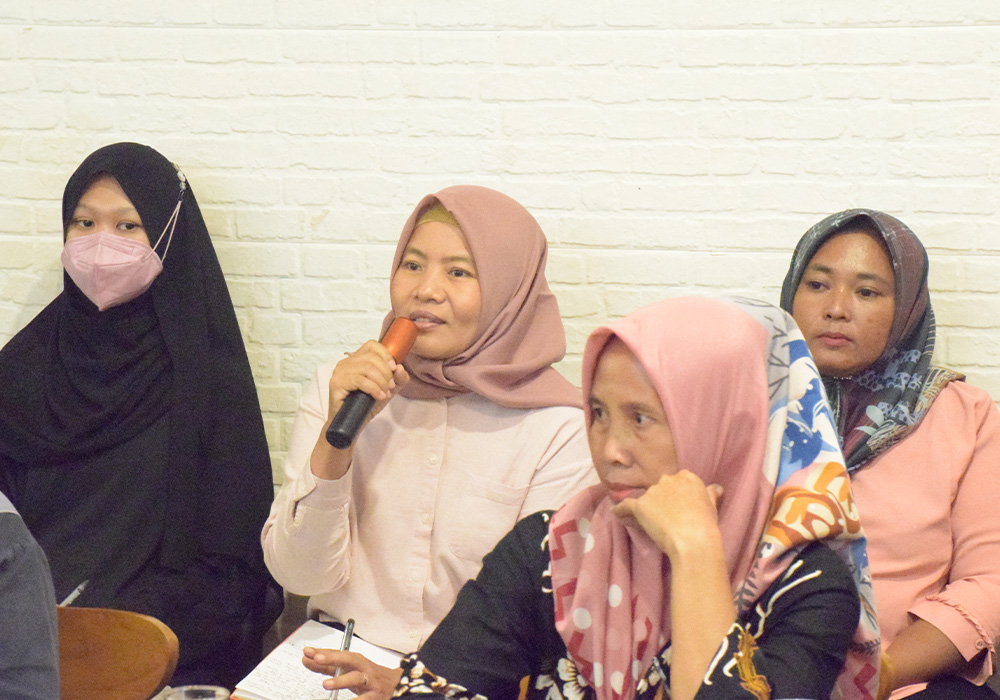
Discussion session to address women's issues related to food and climate crisis, including loss of fish due to global warming. (SAMDHANA/Naely)
- admin
- 18 April 2024
- Feature
The Future is Female: Celebrating Women’s Role in Climate Adaptation
From 5-7 March 2024, the Samdhana Institute celebrated International Women's Day during an event organised by the Parara Consortium in Kemang, Jakarta. Here, a number of remarkable women from around Indonesia shared their experiences, stories of struggle and solidarity, in which traditional knowledge is helping tackle the issue of climate change.
Inland and along coastal areas, Indigenous women all over the archipelago are taking action to lessen the impacts of climate change, finding innovative and eco-friendly ways to meet their families’ food requirements. Here are just a few of the stories they shared at the Parara Women’s Day 2024 in Jakarta.
Traditional farming in NTT
For the Indigenous women of Lembata and East Flores in East Nusa Tenggara (NTT), climate change is already a local issue. When crop failures caused a surge in the price of rice, these women turned to traditional farming methods for a solution.
Working together with local youth groups, they developed an approach called pertanian lahan kering (dry land farming) involving crops like glutinous corn, sorghum, sago and cassava. These plants, which are better suited to arid landscapes and therefore more resilient to drought , have been a staple part of local diets since the time of their ancestors.
“Many young people who previously worked in the city decided to return to the village and became dry land farmers,” explained Imroatul Mukhlishoh from Yayasan Keanekaragaman Hayati or KEHATI, a foundation that works with women and youth groups in Lembata and East Flores.
In addition to reconnecting local communities with traditional foods and agricultural practices, KEHATI has seen various environmental benefits. “This movement helps revitalize local food seeds,” says Imroatul. “Young people have also become active in protecting the environment from the threat of climate change by reforestation.”
The initiative was an eye-opener for the local women and youth groups. It showed them what was possible when they worked together toward a common goal. The group not only managed to provide food for their families, but were also able to generate additional income by selling surplus crops.

Fishing and mangroves in Makassar
Along the southern coast of Sulawesi, climate change is impacting fishing stocks, reflected in the diminishing catches that fisherfolk bring home to their families. Combined with damage to the mangroves that form a natural barrier against extreme weather events, changes are leaving coastal communities increasingly vulnerable to climate change.
Faced with these hardships, the Fisher Women's Group from Makassar – a collective made up of fishermen's wives – has begun generating additional income for their families by making processed products such as meatballs and fish nuggets (baso). They sell these snacks to various hotels, exhibition venues and souvenir shops in the local area.
“We also accept orders for wedding catering,” said Nuraeni, one of the 600 local women to benefit from this new family-based business venture. “We invite our husbands to help with marketing, taking them to hotels and so on, so they feel involved," she added.
The Fisher Women’s Group is also taking steps to regenerate the region’s mangrove forests by planting seedlings in degraded coastal areas. Its aim is to restore the forest, in the hope that the health – and productivity – of marine ecosystems will soon return.
Women on the frontlines of climate change
Eliza Mardian is a researcher from the Centre of Reform on Economics (CORE) Indonesia, an economic think-tank with experience in various economic policy research projects and advisory services. During the event in Jakarta, she outlined some of the ways in which women are disproportionately impacted by climate change.
All around Indonesia, wives, mothers and even daughters are expected to take care of young children and elderly family members. With the worsening climate crisis, many of these women have had to bear an additional burden. “Crop failure and drastically declining catches have forced women to look for alternative sources of income,” explains Elize. “As a result, they are forced to engage in laborious physical work or travel long distances to obtain food."
Many of these women do not share the same power, privileges, rights and opportunities as most men. But if communities are to resist the impacts of climate change, women’s agency and their contributions will be essential. The Women’s Day symposium in Jakarta demonstrated that women all over Indonesia possess the knowledge, skills and initiative needed to make adaptation a reality, especially when it comes to the utilisation of natural resources.
Eliza believes that expanding women's role beyond traditional gender stereotypes and into leading roles in community businesses could hold the key. "Women's participation in decision-making processes is essential for effective climate action,” says Eliza, highlighting that women’s involvement is proven to increase productivity, enhance food security and even reduce carbon emissions.
Investing in women, building a more sustainable future
Looking to the future, it is essential that women are engaged in strategies that leverage their unique skill sets and knowledge for environmental revival. Women's contributions can help reverse biodiversity loss, repair ecological degradation and ultimately help mitigate climate change.
To support this process, Samdhana have teamed up with organizations all over Indonesia, working together to develop women's knowledge and build their skills, so they are better able to address food security issues and combat the impacts of climate change in their communities. In practice, this process includes workshops and capacity development programmes for women, through the establishment of small businesses based around sustainable agriculture and local food initiatives.
To help these ventures get off the ground, networking is essential. Samdhana is helping women make connections, gain access to new opportunities, build relationships and benefit from support systems. Samdhana works to connect women’s groups and various other stakeholders, including government, local communities, national organizations and markets, providing women with a platform to showcase their initiatives through product exhibits at various events. This includes collaborative projects with Panen Raya Nusantara or PARARA and the Ministry of Environment and Forestry, who frequently host exhibitions via Perhutanan Sosial Nasional or PESONA events calendar.

Samdhana’s commitment to Indigenous women
International Women’s Day helps us to recollect the work we have supported with women, to see how far we’ve come, and consider our next steps on the road ahead. Samdhana remains committed to supporting and celebrating the many women who have kept us moving forward over the years. To that end, the Jakarta symposium inspired us to strengthen our ties and redouble our collective efforts. This means helping Indigenous women have access to and control over their territories. By promoting livelihoods and businesses that utilise natural resources sustainably, we also help foster responsibility for their territories. It also involves supporting women’s well-being, not only physically, but also mentally and emotionally. Finally, we must continue to establish community-based institutions, backing women in decision-making processes with the knowledge and capacity-building support they need to uphold their rights and secure their well-being. Ultimately, this will help deliver sustainable governance that is inclusive, equitable and effective.
From cassava in Flores to collectives in Makassar, small steps in the right direction can broaden horizons and bring a more sustainable, more equitable future within reach. International Women’s Day demonstrated the power and the potential of women working together. It served as a reminder that when seeds take root in the wisdom of Indigenous women, they might just grow into solutions on a global scale.
About Parara Women’s Day 2024
Samdhana Institute is a member of the Parara consortium, which organised Parara Women’s Day 2024 in Jakarta. The official event’s theme was ‘Empowering Women, Promoting Equality and Sustainability’ (Pemberdayaan Perempuan, Mendorong Kesetaraan dan keberlanjutan). Participants came from women's organizations and the general public all over Indonesia, particularly from Lampung, Jakarta, Demak and Central Sulawesi Tengah. Held over three days, the event welcomed around 120 women in both online and offline capacities. Its objectives were to highlight issues that hinder social and economic progress for Indonesian women, to promote inclusive and sustainable practices in women's initiatives, and to provide the spur for collective action that can help address disparities in the economic sector and in the social affairs of Indonesian women.